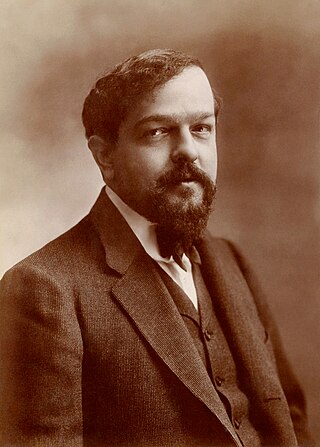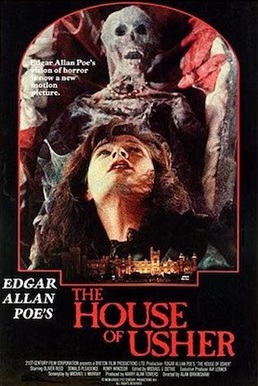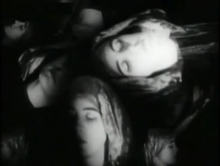The following is an overview of 1928 in film, including significant events, a list of films released and notable births and deaths. Although some films released in 1928 had sound, most were still silent. This year is notable for the introduction of the official mascot of The Walt Disney Company, Mickey Mouse, in the animated short Steamboat Willie, the first film to include a soundtrack completely created in post production.
The year 1912 in film involved some significant events.
The year 1910 in film involved some significant events.

"The Tell-Tale Heart" is a short story by American writer Edgar Allan Poe, first published in 1843. It is told by an unnamed narrator who endeavors to convince the reader of the narrator's sanity while simultaneously describing a murder the narrator committed. The victim was an old man with a filmy pale blue "vulture-eye", as the narrator calls it. The narrator emphasizes the careful calculation of the murder, attempting the perfect crime, complete with dismembering the body in the bathtub and hiding it under the floorboards. Ultimately, the narrator's actions result in hearing a thumping sound, which the narrator interprets as the dead man's beating heart.

"The Fall of the House of Usher" is a short story by American writer Edgar Allan Poe, first published in 1839 in Burton's Gentleman's Magazine, then included in the collection Tales of the Grotesque and Arabesque in 1840. The short story, a work of Gothic fiction, includes themes of madness, family, isolation, and metaphysical identities.

House of Usher is a 1960 American gothic horror film directed by Roger Corman and written by Richard Matheson from the 1839 short story "The Fall of the House of Usher" by Edgar Allan Poe. The film was the first of eight Corman/Poe feature films and stars Vincent Price, Myrna Fahey, Mark Damon and Harry Ellerbe.
James Sibley Watson Jr. was an American medical doctor, philanthropist, publisher, editor, photographer, and early experimenter in motion pictures.

The Fall of the House of Usher is a 1928 French horror film directed by Jean Epstein, one of several films based on the 1839 Gothic short story The Fall of the House of Usher by Edgar Allan Poe.

The Fall of the House of Usher is an opera by Peter Hammill (music) and Chris Judge Smith (libretto). It is based on the 1839 short story of the same name by Edgar Allan Poe.

American poet and short story writer Edgar Allan Poe has had significant influence in television and film. Many are adaptations of Poe's work, others merely reference it.
"The Haunted Palace" is a poem by Edgar Allan Poe. The 48-line poem was first released in the April 1839 issue of Nathan Brooks' American Museum magazine. It was eventually incorporated into "The Fall of the House of Usher" as a song written by Roderick Usher.
The House of Usher is a 2006 American drama thriller film based on the 1839 Edgar Allan Poe short story "The Fall of the House of Usher". The film was directed by Hayley Cloake and written by Collin Chang. It stars Austin Nichols, Izabella Miko and Beth Grant.

La chute de la maison Usher is an unfinished opera in one act by Claude Debussy to his own libretto, based on Edgar Allan Poe's 1839 short story "The Fall of the House of Usher". The composer worked on the score between 1908 and 1917 but it was never completed.
"The Fall of the House of Usher" is an 1839 short story by Edgar Allan Poe.

Descendant is a 2003 film starring Katherine Heigl and Jeremy London based on the 1839 short story "The Fall of the House of Usher" by Edgar Allan Poe.
The Fall of the House of Usher is a 1950 British horror film directed by Ivan Barnett and starring Gwen Watford in her film debut, with Kaye Tendeter and Irving Steen. It is an adaptation of the 1839 short story of the same title by Edgar Allan Poe.

Hildegarde Lasell Watson was an American actress, singer, writer and arts patron.

The Fall of the House of Usher is an American gothic horror drama television miniseries created by Mike Flanagan. All eight episodes were released on Netflix on October 12, 2023, each directed by either Flanagan or Michael Fimognari, with the latter also acting as cinematographer for the entire series.

The House of Usher is a 1989 horror film directed by Alan Birkinshaw and starring Oliver Reed, Donald Pleasence, and Romy Walthall. It is an adaptation of "The Fall of the House of Usher" by Edgar Allan Poe.

What Moves the Dead is a 2022 horror novella by Ursula Vernon, writing under the pen name T. Kingfisher. It is based on the short story The Fall of the House of Usher by Edgar Allan Poe. The novella received critical acclaim, including a win for the 2023 Locus Award for Best Horror Novel and a nomination for the 2023 Hugo Award for Best Novella.












